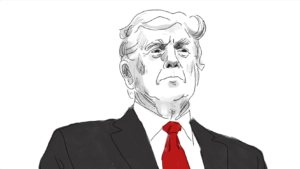On April 6, President Donald J. Trump met with Chinese President Xi Jinping for a series of meetings that Trump described as “tremendous.”
About halfway through Jinping’s visit, President Trump had announced that he ordered a missile strike in Syria on an airfield, as a way to retaliate for the chemical attack suspected to be a product of Syrian President Bashar al-Assad’s regime earlier this week. The attack killed at least 72 people on Tuesday, including 20 children.
The missile strike, which President Trump ordered on Thursday, launched 59 Tomahawk cruise missiles at the same place that housed the warplanes that delivered the chemical attacks. This is the first time that the U.S. military has taken action against Assad. Six people were killed.
“It is in this vital national security interest of the United States to prevent and deter the spread and use of deadly chemical weapons,” President Trump said on Thursday. “There can be no dispute that Syria used banned chemical weapons, violated its obligations under the Chemical Weapons Convention and ignored the urging of the UN Security Council. Years of previous attempts at changing Assad’s behavior have all failed and failed very dramatically.”
In a press conference on April 7, Nikki Haley, the U.S. ambassador to the United Nations, announced that the U.S. is “prepared to do more” in Syria. “The United States took a very measured step last night. We are prepared to do more, but we hope that will not be necessary.”
It is still in question as to whether or not Russia was involved in the chemical attack that prompted President Trump to take action.
There has been a history of tension between President Trump and China. During the 2016 presidential election, Trump referred to China as a “currency manipulator” and said, “We can’t continue to allow China to rape our country, and that’s what they’re doing. It’s the greatest theft in the history of the world.”
On April 7, the Senate confirmed Neil Gorsuch in a 54-45 vote. Maine Senators Susan Collins and Angus King split their votes, with Collins voting in favor of Gorsuch and King against. Gorsuch will fill the ninth seat that has been vacant since February 2016, following the death of Justice Antonin Scalia. In the vote, three Democrats crossed party lines in support of Gorsuch, who is currently an appeals court justice.
While many Republicans are pleased with the future Supreme Court Justice, Democrats are still unimpressed. Chuck Schumer, the Senate Minority Leader, said that there will be “less faith in the Supreme Court” when Gorsuch takes his seat.
Republicans, however, argue that the Democratic party has been unfair to Gorsuch, saying that he is qualified for the nomination and that he has been unfairly represented. Part of their argument is rooted in the fact that Gorsuch is experienced and shares many of the same ideologies that Scalia possessed during his time on the Supreme Court.
Gorsuch will be sworn in on Monday, April 10.















